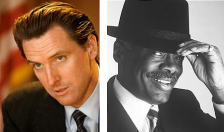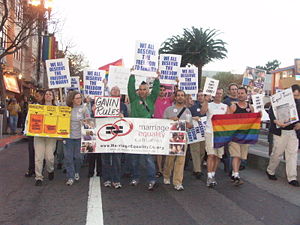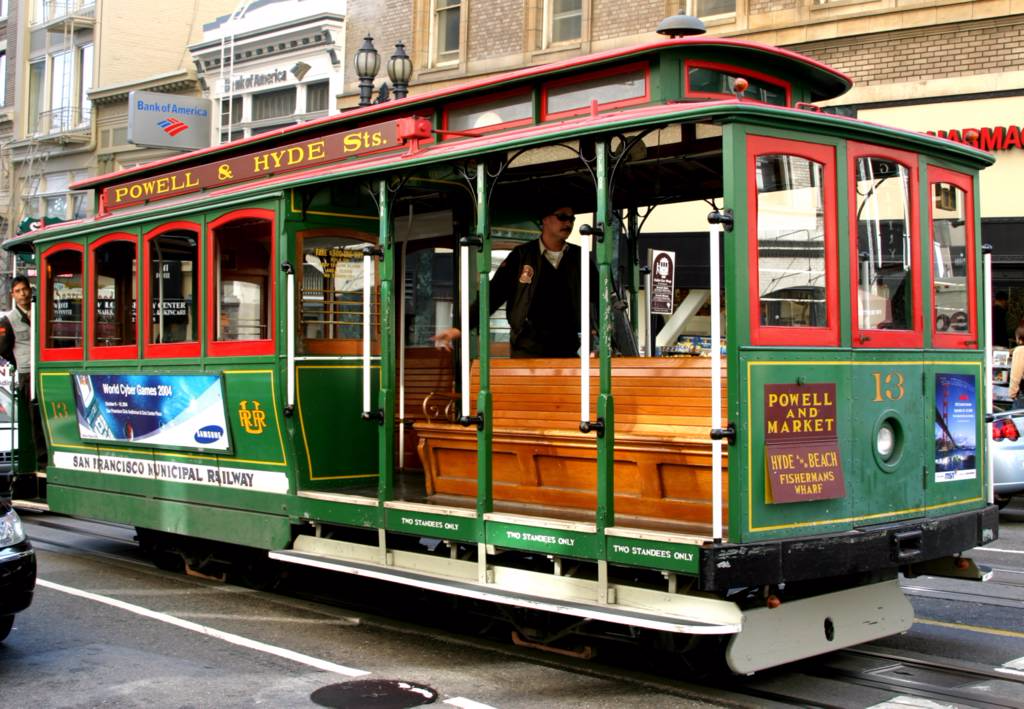San Francisco Bay Guardian, September 20, 2000
GAY-VOTE GAMES
The machine’s “Lavender Sweep” plan to divide gay and progressive voters
By Savannah Blackwell
Chris Daly organizes low-income tenants and has helped lead the Mission’s anti-displacement movement. Chris Dittenhafer heads a group of small merchants on Polk Street and has lent his image to the political cause of big taxi companies.
Daly is straight. Dittenhafer is gay. Both are running for supervisor for District Six, which encompasses the Mission, South of Market, and the Tenderloin. Daly has the support of many members of the Harvey Milk Lesbian/Gay/Bisexual/Transgendr Democratic Club. Dittenhafer is part of the Alice B. Toklas Lesbian/Gay Democratic Club’s “Lavender Sweep”slate – a strategy, devised by political consultant Robert Barnes, aimed at getting five queers elected to the 11-member Board of Supervisors. The sweep is part of a broader machine-friendly lineup being pushed by the Alice B. Toklas club and Barnes.
The two clubs’ respective endorsements show the striking difference between the strategy of Alice and Barnes, who is heavily involved in the club, and that of the Milk Club and Milk heir apparent Tom Ammiano, who endorsed a straight woman known for her leadership on environmental issues for supervisor in District 6 (see “District Six Dilemma,” 9/13/00). Both Ammiano and Milk have only endorsed two queers for supervisor. The endorsements also reflect widening splits in queer-community politics. Alice and Milk, both highly influential in the city’s gay community, are appealing to different factions within that community. “What’s becoming clear is that more and more the gay community is becoming economically split,” pollster David Binder told the Bay Guardian. “You’ve got more conservative gays living on the hills, and then on the flatlands you’ve got more progressives. Politically, we’re seeing the aging and maturation of the community and a moving into more or less two different camps.”
Another indicator of the divide: Alice supports the mayor’s pet measure on the November ballot, Proposition K, while Milk opposes it.
As the direct heir to Milk’s political legacy, the Milk club has long reflected more leftist, progressive values, such as keeping rents affordable for working-class people and supporting workers’ rights, whereas Alice has been closer to the machine – endorsing Dianne Feinstein’s bids for mayor in the late ‘70s and early ‘80s. The Milk club was more willing to go out on a limb for riskier candidates, while Alice played close to the machine.
Case in point: Alice didn’t endorse Harvey Milk in his two bids for supervisor and for state assembly. The club was an early and stalwart supporter of Mayor Willie Brown in his reelection campaign against Ammiano. Indeed, political historians note, one reason for the Milk Club’s formation in 1977 was to assemble a group of gay Democrats willing to put the word “gay” in the group’s title (see “Happy Birthday Milk Club” 5/14/97).
With the return of district elections – a system that brought San Francisco to its first openly gay supervisor – the heirs to Harvey Milk’s political legacy are endorsing only two candidates for supervisor who identify as queer. Alice, on the other hand, has endorsed five.
So why is the Alice club pushing the slate with more queers than Milk? Milkers and Ammiano say the Alice club is using the gay card to push a machine-friendly group of supervisors that will ensure that Brown maintains his tight grip on the board. Alice charges that Milk is failing to cultivate gay candidates and is departing from its roots.
Milkers explain that their choices reflect the maturation of the city’s gay political movement, to a firm place at the table of power. Now, the Milk club and Ammiano’s litmus test is progressive politics – whether candidates are independent from the entrenched, local Democratic machine and the corporate money that sustains it, as well as where they stand on issues such as tenants rights, gentrification, and privatization of city resources.
“The lesbian and gay movements are all grown up now,” Doug Comstock, a longtime gay political consultant who is running the campaign of Matt Gonzalez, a straight progressive, for supervisor in District Five against Juanita Owens, a queer Latina who has long served on the Board of Education and whom Alice has endorsed. “We’re part of a broader constituency concerned about real issues, such as housing and [the city’s lack of] planning.”
“If a candidate wants to run and win these days, they’ve got to have good gay politics,” Milk political action committee cochair Jerry Threet said. Threet is running the campaign of straight, white neighborhood activist Jake McGoldrick against incumbent Michael Yaki, who is straight and endorsed by Alice.
Ammiano’s list of endorsements varies only slightly from that of Milk. But the issues he and Milk leaders cite as key to their support are nearly identical.
“What we want today is independent, homework-oriented candidates who won’t take money from downtown,” Ammiano told us. “Then you look at [sexual] orientation and race…. I don’t care if a candidate is gay if [he or she] has terrible politics.”
Ammiano called the Alice and Barnes Lavender Sweep “manipulative” and a “cheap shot,” charging that Barnes has used the club to strengthen his clients’ credibility with gay voters. Alice cochair Dean Goodwin says the club considers Barne’s advice but functions independently from the interests of his clients.
Rich de Leon, the chair of the political science department at San Francisco State University, told the Bay Guardian that the last mayoral race – Alice supported Brown, while Milk supported Ammiano – was a watershed moment in the maturation of the gay movement.
“It seems to me that San Francisco politics have reached a level of maturity where we’re branching out from identity politics to politics of ideology,” de Leon said. “That’s a good thing, and it was reflected in the last mayor’s race. Outside of the city the race was portrayed as a black, liberal straight guy versus a white, liberal gay guy. But inside the city it wasn’t about that. It was about [where the two stood] on issues such as housing and dot-com growth.”
Meanwhile, gay political consultant and soft money shepherd Barnes is banking on many gay voters still voting queer first, politics second. Aside from Ammiano, the Lavender Sweep slate mostly includes candidates whose politics are moderate on the San Francisco spectrum and who generally do not pose a threat to the machine.
Some are not the mayor’s first choices, but in the face of a runoff with a community leader endorsed by Milk or Ammiano, they are candidates he and big money will support.
Early this year Alice’s executive officers scanned the field of potential district supervisors and took note of several queer incumbents whose chances of winning looked good and who, in the opinion of Alice’s leaders, had solid records of building consensus on issues.
“[The Lavender Sweep] came out of an organic process of the executive board,” Goodwin said. “We saw early that there were several strong incumbents – Leslie Katz, Tom Ammiano, and Mark Leno. We knew Lawrence Wong and, of course, Juanita Owens. So there were five really strong candidates that, on the issues, are very diverse.”
Katz later dropped out, and Alice recently endorsed Dittenhafer, who replaced Katz as the mayor’s choice for District Six.
Ammiano and Milk members say it should come as no surprise that Milk did not endorse those candidates. Aside from Ammiano – who chafed at the use of his name in association with the four other sweep members – none of them are candidates Milk would endorse.
“When queer politics got started in this city, it was synonymous with progressive politics. Milk was the leading example of that. It’s no accident that the Milk Club doesn’t endorse candidates who are not progressive,” equal benefits advocate and former Milk club president Jeff Sheehy told the Bay Guardian.
“Anyone who would vote to privatize schools is bad news,” Sheehy said, referring to school board member and candidate for District Five supervisor Owens’s consistent support of the privatization of the Edison School. Owens’s political career owes much to her former consultant, Barnes.
Her campaign is expected to benefit from soft money from business interests. As a member of the Democratic County Central Committee, Owens voted against endorsing Proposition I – which would slow dot-com office growth in neighborhoods where residents are being forced out by high rents, and for Proposition G, which would stall closure of JFK Drive on Saturdays. A landlord, she abstained on the two tenant initiatives. Owens did not return Bay Guardian calls for comment.
Alice’s candidate for District Three, Community College Board member Lawrence Wong, is not threat to moneyed interests – his campaign literature is aimed at business groups. On the college board Wong supported keeping the ROTC on campus after gay students opposed its presence because of the military’s position on gays within its ranks. Brown’s favorite is incumbent Alicia Becerril, who is straight. But in a runoff against feisty neighborhood activist Aaron Peskin – a straight man endorsed by Ammiano, the Milk Club, longtime gay leader Harry Britt, and Assemblymember Carole Migden – Brown would clearly support Wong.
Alice’s candidate for District Eight, Mark Leno, has recently started to distance himself from Brown. In June, for example, he voted against the Bryant Square dot-com office development that galvanized opposition in the Mission. But during most of his tenure he generally has voted with the rest of the Brown-appointed majority. Most recently he sided with the majority against putting a municipal utility district measure on the ballot. Barnes and Alice expect Leno to win easily against Ammiano and Milk’s Eileen Hansen, who is also gay but identifies more with tenants and the leftist roots of the old Castro.
The rest of Alice’s slate fits neatly with that of the mayor – with the notable exception of District 11, where Alice endorsed neighborhood activist Rebecca Silverberg over incumbent Amos Brown. Otherwise the list reads the same; incumbent Michael Yaki for District One, incumbent Gavin Newsom for Two, political consultant and Barnes colleague Tom Hsieh Jr. for Four over incumbent and independent Leland Yee, Sup. Mabel Teng for Seven, incumbent Mark Leno for Eight, and planning commissioner Linda Richardson for District 10. (Ammiano is running unopposed from District 9). Key to the Milk club’s endorsements was a candidate’s position on progressive issues such as the two tenant initiatives (H and N) and the dueling measures on controlling dot-com office growth (K and L); not so for Alice.
“Alice is about coalition building,” Goodwin said. “We don’t have a litmus test around propositions…. To get things done you have to be able to work with everybody. We look at your ability to build consensus.”
Milk, Goodwin said, is “looking at housing and renters’ issues…. Maybe it should be called the Harvey Milk Progressive Club.” Milk president Phillip Babcock defended the club‘s emphasis on issues. “We are a lesbian and gay democratic club. We have the responsibility to have strong independent leaders who support the community.”
“The issues that came up over and over [as key issues to the Club] were K and L, the tenant issues, campaign finance, and ethics,” Babcock said. “We also wanted to see who was independent of not just the mayor but also downtown money.”
“If the Lavender Sweep only includes machine candidates, it’s not a lavender slate,” Babcock said. “[Alice’s] slate is not about a lavender slate. It’s about a machine lavender slate. Everything Harvey fought against. People have to represent the community first and the interests of the administration second.” ■
The lavender soft-money sweepstakes
The Alice B. Toklas Lesbian/Gay Democratic Club will play a major role in steering soft money from business interests into supervisorial and other campaigns – and many members of the Lavender Sweep will benefit. On Sept. 11 Alice formed a fundraising committee headed by political consultant Robert Barnes. “I imagine that will start happening between now and the end of October,” Alice cochair Dean Goodwin said. Barnes confirmed that he will play a lead role in independent expenditure campaigns for various races.
Alice spent more than $100,000 on reelecting Brown, according to reports filed with the Ethics Commission and Barnes. Contributors included corporations and individuals with business before the city, such as Norcal Waste Systems, Gap CEO Don Fisher, and live-work developer Joe O’Donoghue.
After the mayor’s reelection last December – which depended heavily on a multi-million dollar independent expenditure campaign orchestrated by Barnes, the Committee on Jobs’ Mark Mosher, and consultant John Whitehurst – Barnes formed Barnes, Mosher and Whitehurst. The BMW team is expected to marshal hordes of soft money for district elections. Voters can expect a deluge of mailers and ads supporting Alice’s slate.
But Rich de Leon, the chair of the political science department at San Francisco Sate University, said the Harvey Milk Lesbian/Gay/Bisexual/Transgender Democratic Club’s support for candidates with strong ties to the neighborhood might play better than big money: “[The soft money campaign] might not be a successful as they might hope,” de Leon said. “I think that can turn people off…. The successful gay candidate will be elected because they’re seen as good leaders across the neighborhood.”







